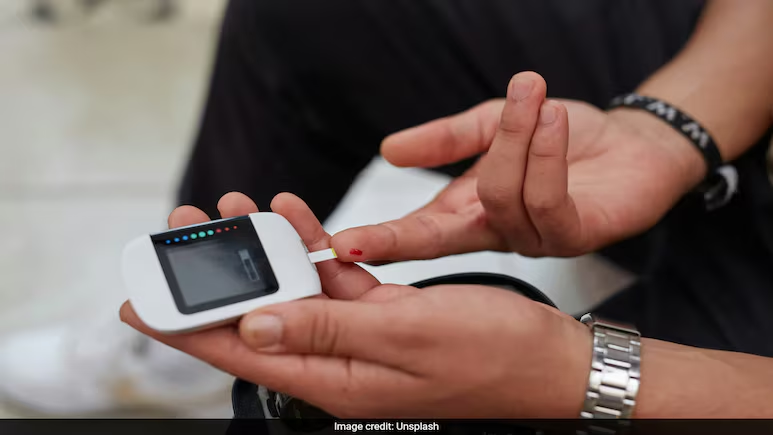High Blood Sugar Levels May Impact Male Sexual Health, Study Finds

High Blood Sugar Levels May Impact Male Sexual Health, Study Finds
Research highlights the adverse effects of elevated blood sugar on men's sexual health, linking it to decreased testosterone and erectile function.
Recent findings presented at the Endocrine Society's annual meeting, ENDO 2025, indicate that elevated blood sugar levels can negatively affect men's sexual health. While the study has yet to undergo peer review, it suggests that even modest increases in blood sugar, remaining below diabetic thresholds, can reduce sperm motility and impair erectile function.
The research involved an analysis of health records belonging to 110 adult males, all of whom were living with obesity or type 2 diabetes. These individuals were undergoing treatment with weight-loss medications and were not receiving any testosterone or hormonal therapy. Following a 10% reduction in body weight, researchers observed an increase in the proportion of men with normal total and free testosterone levels, which rose from 53% to 77%.
As per this preliminary research, which took place in San Francisco, elevated blood sugar can lead to a decline in testosterone levels. Although testosterone does not directly determine erectile function, it is closely related to libido, which is an essential factor in sexual performance.
Notably, high glucose levels can inflict damage on both nerves and blood vessels, critical components for successfully achieving and maintaining an erection. This damage can consequently result in erectile dysfunction.
Experts recommend a balanced diet rich in whole foods and fibre to help regulate blood sugar levels and mitigate inflammation. Regular physical exercise is also encouraged as it enhances insulin sensitivity and supports weight loss efforts. Techniques such as meditation and yoga may further improve mental and emotional well-being, which also play a vital role in sexual health.
Certain medications like semaglutide, liraglutide, and tirzepatide are effective in managing blood sugar levels. Dr Shellsea Portillo Canales, an endocrinology fellow at SSM Health St. Louis University Hospital, remarked, "While it is well known that weight loss from lifestyle changes or bariatric surgery increases testosterone levels, the impact that anti-obesity medications may also have on these levels has not been widely studied."
Dr Canales further stated, "Our study is among the first to provide compelling evidence that low testosterone can be reversed with the use of commonly prescribed anti-obesity medications."
This research underscores the importance of maintaining healthy blood sugar levels for not just physical well-being but also sexual health. Continued exploration in this field may lead to more informed approaches for managing men's health issues associated with elevated blood sugar.
The research involved an analysis of health records belonging to 110 adult males, all of whom were living with obesity or type 2 diabetes. These individuals were undergoing treatment with weight-loss medications and were not receiving any testosterone or hormonal therapy. Following a 10% reduction in body weight, researchers observed an increase in the proportion of men with normal total and free testosterone levels, which rose from 53% to 77%.
As per this preliminary research, which took place in San Francisco, elevated blood sugar can lead to a decline in testosterone levels. Although testosterone does not directly determine erectile function, it is closely related to libido, which is an essential factor in sexual performance.
Notably, high glucose levels can inflict damage on both nerves and blood vessels, critical components for successfully achieving and maintaining an erection. This damage can consequently result in erectile dysfunction.
Experts recommend a balanced diet rich in whole foods and fibre to help regulate blood sugar levels and mitigate inflammation. Regular physical exercise is also encouraged as it enhances insulin sensitivity and supports weight loss efforts. Techniques such as meditation and yoga may further improve mental and emotional well-being, which also play a vital role in sexual health.
Certain medications like semaglutide, liraglutide, and tirzepatide are effective in managing blood sugar levels. Dr Shellsea Portillo Canales, an endocrinology fellow at SSM Health St. Louis University Hospital, remarked, "While it is well known that weight loss from lifestyle changes or bariatric surgery increases testosterone levels, the impact that anti-obesity medications may also have on these levels has not been widely studied."
Dr Canales further stated, "Our study is among the first to provide compelling evidence that low testosterone can be reversed with the use of commonly prescribed anti-obesity medications."
This research underscores the importance of maintaining healthy blood sugar levels for not just physical well-being but also sexual health. Continued exploration in this field may lead to more informed approaches for managing men's health issues associated with elevated blood sugar.

Reliance Retail acquires Kelvinator, The Coolest One
Reliance Retail has purchased the Kelvinator brand from Electrolux for nearly ₹160 crore, aiming to strengthen its position in India's consumer durables market.
| 2025-07-19

Saiyyara has shattered every myth about launching newcomers. No big names, no big PR
Madhur Bhandarkar praises debut film 'Saiyaara' for its raw talent and storytelling, marking a shift in Bollywood's approach to newcomers.
| 2025-07-19

India slams reports blaming pilots for Air India crash
India's AAIB disputes US media assertions regarding Air India AI 171 crash, highlighting ongoing investigation and sensitivity towards victims' families.
| 2025-07-18

India Secures Four-Wicket Win in ODI Series Opener Against England
India achieves a four-wicket victory over England in the ODI series opener, led by Deepti Sharma's unbeaten 62 runs.
| 2025-07-17

Air India inspection claims no problems found with Boeing 787 fuel control switches
Air India has conducted thorough inspections of its Boeing 787 fuel control switches, reporting no problems following a DGCA directive.
| 2025-07-17




